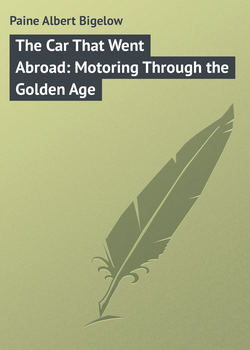Читать книгу The Car That Went Abroad: Motoring Through the Golden Age - Paine Albert Bigelow - Страница 14
Part I
THE CAR THAT WENT ABROAD
Chapter XIII
THE HOUSE OF HEADS
ОглавлениеI ought to say, I suppose, that we were no longer in Provence. Even at Avignon we were in Venaissin, according to present geography, and when we crossed the Rhone we passed into Languedoc. Now, at Valence, we were in Dauphiné, of which Valence is the "chief-lieu," meaning, I take it, the official headquarters. I do not think these are the old divisions at all, and in any case it all has been "the Midi," which to us is the Provence, the vineland, songland, and storyland of a nation where vine and song and story flourish everywhere so lavishly that strangers come, never to bring, but only to carry away.
At Valence, however, romance hesitates on the outskirts. The light of other days grows dim in its newer electric glow. Old castles surmount the hilltops, but one needs a field glass to see them. The city itself is modern and busy, prosperous in its manufacture of iron, silk, macaroni, and certain very good liquors.
I believe the chief attraction of Valence is the "House of the Heads." Our guidebook has a picture which shows Napoleon Bonaparte standing at the entrance, making his adieus to Montalivet, who, in a later day, was to become his minister. Napoleon had completed his military education in the artillery school of Valence, and at the moment was setting out to fulfill his dream of conquest. It is rather curious, when you think of it, that the great natural stone portrait already described should be such a little distance away.
To go back to the House of the Heads: Our book made only the briefest mention of its construction, and told nothing at all of its traditions. We stood in front of it, gazing in the dim evening light at the crumbling carved faces of its façade, peering through into its ancient court where there are now apartments to let, wondering as to its history. One goes raking about in the dusty places of his memory at such moments; returning suddenly from an excursion of that sort, I said I recalled the story of a house of carved heads – something I had heard, or read, long ago – and that this must be the identical house concerning which the story had been told.
It was like this: There was a wealthy old bachelor of ancient days who had spent his life in collecting rare treasures of art; pictures, tapestries, choice metal-work, arms – everything that was beautiful and rare; his home was a storehouse of priceless things. He lived among them, attended only by a single servant – the old woman who had been his nurse – a plain, masculine creature, large of frame, still strong and brawny, stout of heart and of steadfast loyalty. When the master was away gathering new treasures she slept in the room where the arms were kept, with a short, sharp, two-edged museum piece by her couch, and without fear.
One morning he told her of a journey he was about to take, and said: "I hesitate to leave you here alone. You are no longer young."
But she answered: "Only by the count of years, not by the measure of strength or vigilance. I am not afraid."
So he left her, to return on the third day. But on the evening of the second day, when the old servant went down to the lower basement for fuel – silently, in her softly slippered feet – she heard low voices at a small window that opened to the court. She crept over to it and found that a portion of the sash had been removed; listening, she learned that a group of men outside in the dusk were planning to enter and rob the house. They were to wait until she was asleep, then creep in through the window, make their way upstairs, kill her, and carry off the treasures.
It seemed a good plan, but as the old servant listened she formed a better one. She crept back upstairs, not to lock herself in and stand a siege, but to get her weapon, the short, heavy sword with its two razor edges. Then she came back and sat down to wait. While she was waiting she entertained herself by listening to their plans and taking a little quiet muscle exercise. By and by she heard them say that the old hag would surely be asleep by this time. The "old hag" smiled grimly and got ready.
